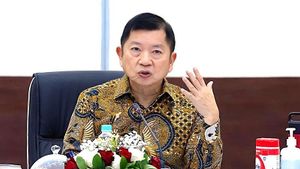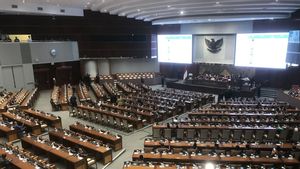
JAKARTA - The government will soon apply a single salary for civil servants (PNS) in line with the ratification of Law (UU) Number 20 of 2023 concerning State Civil Apparatus (ASN) on October 31, 2023.
Previously, the Ministry of National Development Planning (PPN) or Bappenas had revealed the basic principles of implementing a single salary for civil servants (PNS).
Meanwhile, with a single payroll system scheme, the existing allowances will be abolished and put into wages.
So that civil servants only receive basic salary, but the number is enlarged.
Public Policy Observer Trubus Rahadiansyah assessed that the single salt system scheme has the potential to increase the budget for personnel expenditures in the APBN/APBD.
"Yes, the impact is that the single salt direction will burden the state budget, because there will be salaries for the center and in the regions," he told VOI, Monday, November 20.
Trubus also explained that the single salary system is expected by civil servants to work better and get a bigger salary.
In addition, said Trubus, the single sale will at the same time remove the ASN allowance system.
"The civil servant salary obtained so far is small, but the allowance is large, in the latest regulation, civil servant allowances or ASN will be used as a single sale," he said.
On the other hand, the increase in salary is expected to boost the wheels of the national economy because people's purchasing power increases so that it will have an impact on the household consumption index.
"Gaji akan relatif besar, otomatis akan meturn roda perekonomian sehingga UMKM bisa hidup karena konsumsi rumah tangga akan ikut naik dan membuat pertumbuhan ekonomi di daerah masing-masing," jelasnya.
Trubus hopes that with the turn of the economy, it will increase the household consumption index by 2 digits, if household consumption can be boosted optimally so that it has an impact on the economy.
Meanwhile, Indef Economist Nailul Huda said that changes in the payroll system in ASN must also be balanced with the different performance, duties, and basic functions of ASN.
"I actually agree with the commitment of ASN to be prosperous, but I have to look at the point of view of performance, duties, and basic functions. ASNs whose working hours are different must also be distinguished from their remuneration. Likewise, their performance is just sitting, stamping, and others must be distinguished from ASNs whose work is more than that even though the gradings are the same," he explained.
관련 항목:
According to Huda, this is because there must be incentives for ASN to work harder. And there must also be the heaviest sanctions (dismissal) if they do not meet certain performances.
Huda added that the increase in ASN salaries and labor wages must be adjusted to inflation records and economic growth, where inflation is a general price increase that does increase every year.
"Laboured and ASN are both experiencing inflation, not just one," he said.
The English, Chinese, Japanese, Arabic, and French versions are automatically generated by the AI. So there may still be inaccuracies in translating, please always see Indonesian as our main language. (system supported by DigitalSiber.id)
















